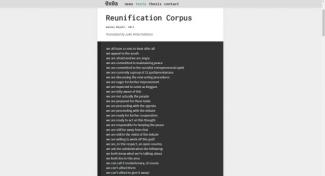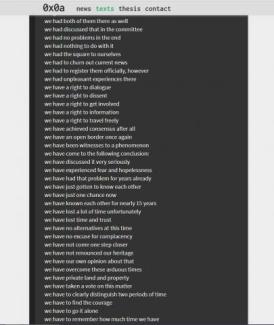Autorenbeschreibung:
Eskaliertes Schreibenlassen.
Author's description:
“We” is a violent word. Not only because a We always requires that You or They be excluded: The violence of We is also an inclusive one. To say “We” is to take possession of those one presumes to speak for. We consumes. And yet, it seems that the only way to resist We is with another We.
Unless, that is, one can elude all this We-speak. The 25 years that have passed since the fall of the Berlin Wall, or die Wende — which an official We, that of reunified Germany, celebrates today — have not been long enough to digest all the little Wes, the ones spoken for and thus consumed. If one goes back to that time — whose images today are icons of a linear, inevitable course of history — and looks at its verbal images, a multiplicity of Wes emerges that can only persist as independent.
The Institute of the German Language’s “Wendekorpus” (Reunification Corpus) contains thousands of Wes. According to its self-description, it was “cooperatively compiled by the IGL and the former Central Institute for Linguistics of the erstwhile GDR’s Academy of Sciences, as part of the project Gesamtdeutsche Korpusinituative (East-West German Corpus Initiative).” It is comprised of approximately 3.3 million continuous word forms culled from 3,387 texts generated between mid-1989 and the end of 1990, such as newspaper articles, leaflets, interviews, speeches, and parliamentary minutes.
Through the Institute of the German Language’s website one can access this Wende corpus. The IGL provides a program for corpus analysis. COSMAS II allows searches for word forms, conjunctions, collocations, and concordances. It allows, too, for some of the little Wes to evade the one great We.
For the poem “Reunification Corpus,” I had COSMAS return all sentences that begin with “we.” In order to get a more readable, concise from, I limited the sentence length to exactly six words: short enough for clear statements, long enough to allow for nuances. The result is not a single great We but many little ones. It is a self-contradictory, schizophrenic cacophony of voices of the reunification period that does not want a denouement and does not need one: “We remained contentious that day.”


